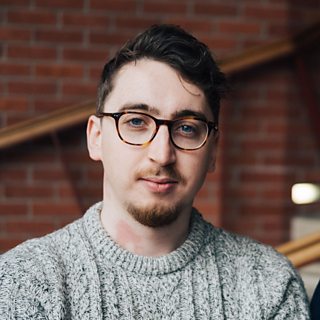Michael Patrick and OisΓn Kearney are the writers of ΒιΆΉΤΌΕΔ Three's , their first project for the ΒιΆΉΤΌΕΔ, which was adapted from their award-winning stage play about friendship, family, grief and ... testicles. They were also part of our writer development group. Michael and OisΓn spoke to us to explain how My Left Nut was brought to the screen through an opportunity with Kay Mellor's Rollem Productions. .
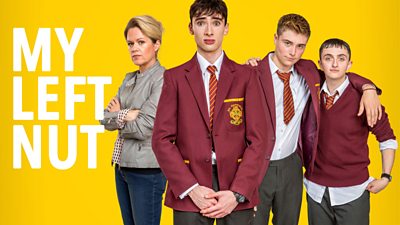
Youβre a writing partnership - have you always written together, how did that come about?
We originally met at university. Being Irish lads in an English University, you kind of gravitate towards each other. We actually ran the University Ireland Society together, which was great fun. We made some student theatre together - Michael acting and OisΓn directing. Then when we graduated, we formed back in Belfast and OisΓn directed Mick in a number of plays. We didnβt start writing together until we wrote the initial stage play for My Left Nut, and weβve continued writing ever since.
And how did you decide to write the My Left Nut stage play?
It came about through a programme called , run by The Irish Theatre Institute, The Dublin Fringe Festival and Fishamble: The New Play Company. The idea is to take actors who have never written anything before through the process of writing their own one-person show. The deadline for applying was coming up and we met up in a pub to talk about ideas. Michael had a big list - alien abductions, the cultural history of the sandwich - but OisΓn told him they were all terrible. Michael then began to reminisce about the time he had a giant testicle, and OisΓn turned to him and said βwrite that playβ. Michael had always wanted to write something about his fatherβs death as well - so combining the two seemed like a good way of exploring masculinity. We were accepted onto the programme and wrote the play together, Michael acting and OisΓn directing.
How did you find that process? Writing that together?
It worked well! It wasnβt without its difficulties, but it felt like a nice extension of our previous working relationship. As we knew Michael would be performing it and OisΓn directing, Michael would get up and perform and try things out as we were writing the script, while OisΓn would make suggestions as we went along. It was all quite organic.
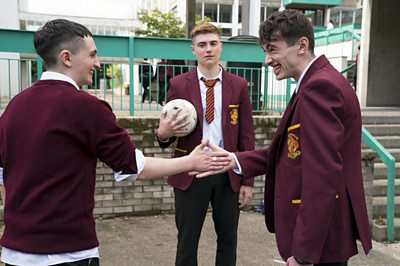
So the play toured Ireland and went to Edinburgh - how did you come to develop it for television?
As part of the ΒιΆΉΤΌΕΔ Writersroom , we were invited to attend workshops and found out about a number of opportunities, including an initiative with Rollem Productions, run by Kay Mellor OBE (Band of Gold, Playing the Field, Fat Friends, The Syndicate, In the Club). Following the success of Overshadowed by Eva OβConnor and Hildegard Ryan, they were looking for stories that would really resonate with young people. At this stage we had already premiered My Left Nut at the Dublin Fringe and begun our Irish tour, so we applied to the programme with an idea of adapting the play. We got through the first round, and Michael actually ended up doing a skype interview from the dressing room of the Pavilion Theatre in Dun Laoghaire an hour before he had to go onstage and perform the play! The interview seemed to go well, but I remember Rollem asked for more examples of our writingβ¦ and I donβt think we really had anything other than My Left Nut. So we cobbled together a few various bits and pieces - scenes from half-written plays and short films - and thankfully Rollem still trusted us, or trusted the story, and agreed to work with us. This meant a 6 month development programme working under the mentorship of Kay Mellor as we developed our scripts and put together pitch documents.
And how did you find that?
It was a bit of an eye opener! We didnβt even own any paid-for script writing software at the time. A lot of our first drafts barely had any stage directions in them at all - so there were a lot of practical things like that which we learnt. The biggest learning curve was the episodic nature of the whole thing. With a stage play you have a fully captive audience - they canβt leave half way through (wellβ¦ they can, but youβd like to hope they wonβt). The biggest thing we struggled with was structuring it in such a way that people would finish one episode and immediately want to watch the next one. So we did have to rework the story a bit to get in those βhooksβ and βcliffhangersβ.
How about dealing with script notes?
Script notes are part of the writing process. You have to remember that producers and commissioners will have a different perspective and are seeking content that is representative, and that they want to put their own stamp on. Taking notes is difficult, but we viewed it as someone experienced having a question or a concern. We would leave it 24 hours before tackling them, and tried to find a solution to any concerns. We received reams of notes and completed countless drafts, sometimes coming back to things we had in our very first draft. It was about trial and error, to create the right tone and style for ΒιΆΉΤΌΕΔ Three.
Are there many other differences from the play?
Weβve updated it to bring it into the modern day - the play is set when Mick was a teenager (early 2000s). The only thing weβve really lost are some silly jokes about Bebo and MSN messenger - but we gain a lot more and it certainly feels more relevant. The big thing we added was an extra storyline of Mickβs girlfriend, Rachael. This was in an early draft of the play, but had to be cut for time reasons - so it was really nice to be able to thread that back in, when we had the ability to extend and develop the story. Itβs also different in that the play is Michael performing his own story - so itβs very personal. Now that we had a young actor playing Mick, and other actors being cast as his family and friends, we had to step back from the real life story and understand that the TV show was different - it was βbased on a true storyβ. Itβs not quite as true to life as the play was, as we had to think about what was best for the story in TV format. But the heart and the message of the story is still absolutely true - which is what was important.
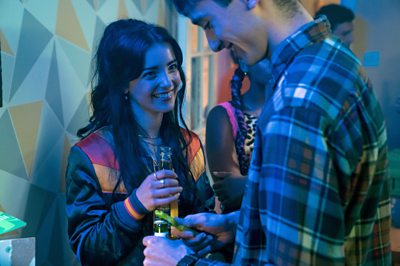
And what is the heart of the story?
Itβs about negotiating life years after the death of a parent. Itβs not about the immediate grief on their death, but what happens years later. The main relationship is a mother and son trying to deal with the difficulties of a young man growing up without a father to help. It also looks at male teenage friendships and how, under all the bravado, there can be a real tenderness and care. Itβs also about balls.
And then it was commissioned - how was that process?
Exhilarating. Lots of meetings and possibilities and conversations - which was all great - but youβre always still thinking βthis is probably not going to happenβ. Then, suddenly, it does happen and everything moves so quickly. We still canβt believe itβs happening, and probably wonβt really feel like itβs happened until we can actually .
Were you involved in casting at all?
We werenβt, no. It was cast predominantly by Carla Stronge who is just amazing, and we knew sheβd find brilliant people. What was lovely is that Michael got the chance to meet with (who plays him) and (playing his mother) to talk them through what actually happened in real life - but also telling them to bring their own spin to it. Itβs not a documentary at the end of the day. Sinead also met with Michaelβs mother and they had a good long chat about everything.
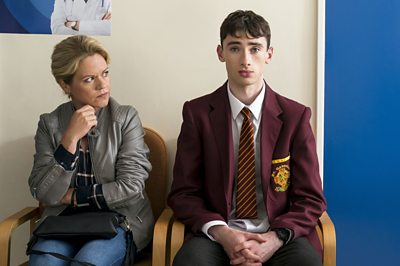
How was it writing about your friendβs experience, OisΓn?
It was daunting. I understood that the basis of is some very personal and sad things that happened to Michaelβs family - the passing of his father and his motherβs husband, and then the strain of dealing with a medical issue. I was humbled that Michael trusted me to co-write the play. I tried my best to be respectful of the subject matter, but also to bring some distance to the writing process - something I had done frequently in working as a documentary director. When it came to the TV series, we both understood we were creating something new, based on real experience but to be developed to create more drama. We knew we would be working with a bigger team, and would thus have less control, so we endeavoured to create the tightest scripts we could. We were delighted when we heard that (Vera, Skins, Desperate Romantics) would be directing.
And how does your mother feel about it all, Michael?
It took her a while to come round to it all. When I first read her the play she didnβt speak to me for a week. Mainly because the play had the stage direction βMick masturbatesβ and she was absolutely mortified. But she eventually came round when she read it again a few times. In a way the piece is a thank you to her for always being there for me. But sheβs very pleased with it all now, and how the play was received, and she absolutely loves Sinead - which is great.
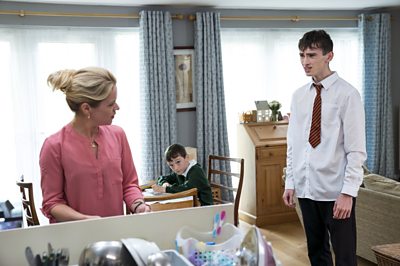
What do you hope people take away from the piece?
If thereβs any young lads watching - check your balls! Donβt be afraid to talk about it to friends or family. It might seem embarrassing, but it takes strength to talk about your issues. We hope people have a good laugh at it and find the drama compelling. We shot it all in Belfast with a local crew which was great for us as well. We hope people enjoy seeing Belfast on screen in a unique way.
